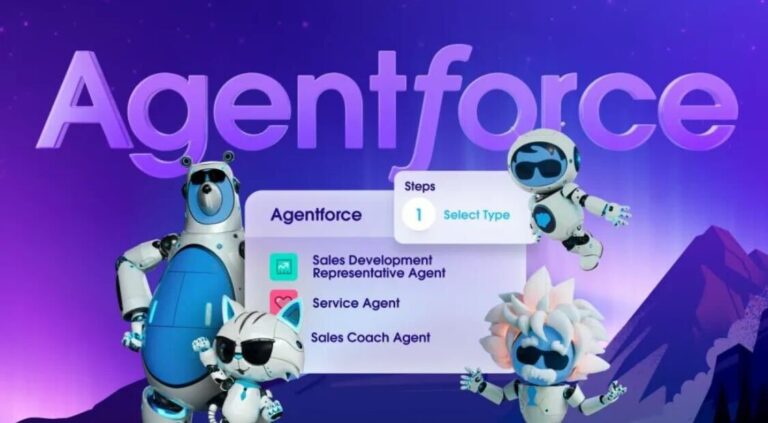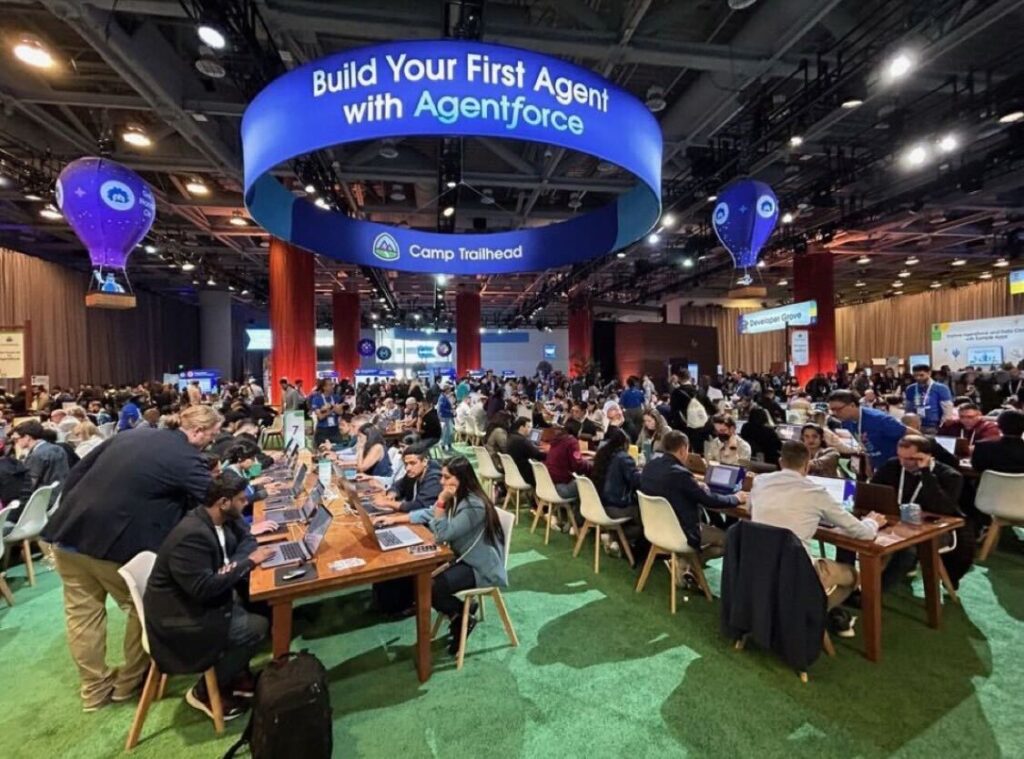It’s been just over a month since the coveted Dreamforce’24 conference hosted by our friends at Salesforce. That being said, by now we’re sure this isn’t the first blog or article you might have stumbled across buzzing about the long awaited Agentforce.
The wait is over, folks! As of today, Agentforce is officially generally available, and we couldn’t be more excited. In fact, we’re already hitting the ground running here at Lane Four—getting our team certified, enabling new capabilities, and gearing up for exciting projects ahead. We’re moving with the momentum of all things Agentforce, and we can’t wait to see what’s next.
While in San Francisco, our team rolled up their sleeves, dove right in, earning new Agentforce badges and sparking meaningful conversations with both existing clients and businesses eager to learn more. But before we get ahead of ourselves, let’s break down what Agentforce really is, and why it’s poised to make waves in the world of AI-powered customer service and automation.
So, what exactly is Agentforce?
Salesforce’s Agentforce is an AI-powered tool built to simplify business processes and deliver tailored, scalable solutions across industries. It enables companies to go even further in automating routine tasks while still maintaining a personal touch—an invaluable advantage for staying ahead in today’s hyperconnected, digital-first environment.

If you’re thinking, “Hasn’t Salesforce already rolled out an AI tool… so what’s the hype around Agentforce?” you’re not far off. However, with Agentforce being the star of this year’s Dreamforce ‘24 and World Tour events, it marks a significant leap forward in Salesforce’s generative AI (genAI) capabilities.
While Agentforce is technically the ‘newest’ AI platform, it would be more helpful to note that it is not a brand new singular product introduced by Salesforce. It can moreso be seen as an AI-driven assembly of previously launched features designed to help build on the well-known Einstein (Co-Pilot) functionality. It essentially combines the power of Prompt Builder, ChatBots, and Einstein to elevate automation, enabling companies to create and customize AI agents that perform tasks more efficiently while maintaining a personal touch. However, Agentforce now marks the shift from last year’s “Human in the Loop AI” theme, with AI agents now being capable of completing tasks autonomously. These agents are tailor-made for common tasks across the Customer 360 platform, including pipeline building, case deflection, and sales team coaching, with Data Cloud being what Salesforce is referring to as “the heartbeat of the Salesforce Platform and foundation of Agentforce”.
While discussions about AI have been ubiquitous—more than ever in 2024—we truly believe that at this point, if you or your team has not found a way to accept and integrate AI into your operations yet, you’re probably falling behind. By embracing AI, businesses can deliver faster, more personalized service, ultimately elevating customer experience overall. And whether it’s supporting customer service teams or boosting sales, Agentforce is set to be a key player in the future of intelligent automation.
Use Cases and Impact Across Multiple Functions
Agentforce’s versatility extends across a variety of use cases, similar to Einstein Bots but with far more advanced capabilities. For instance, Agentforce can be trained using company documents, access Salesforce objects and data, and generate dynamic, real-time responses. Its AI agents can take on roles like customer support agents, Sales Development Representatives (SDRs), personal assistants, or even sales coaches—roles traditionally solely managed by human teams but now optimized through automation.
Even industries like retail, healthcare, and financial services can now greatly benefit from Agentforce. Today’s customers expect quick, efficient, and tailored interactions, and this AI solution makes it possible. By automating key processes and integrating into various digital platforms such as web chat, social media, and messaging platforms, Agentforce aims to help companies reduce costs while improving response times, allowing them to stay competitive in an increasingly fast-paced market.
Agentforce significantly influences a wide range of stakeholders within an organization; here’s a few examples.
Sales
Dynamically generate sales tasks like composing personalized emails, scheduling meetings, and preparing for the next interaction.
Service
Auto-generate personalized agent responses grounded in trusted CRM data (Service Replies). Auto-generate case wrap-up summaries (Work Summaries). Summarize support interactions to save agent time and create knowledge articles from past case notes (Knowledge Articles).
Marketing
Efficiently generate personalized content to engage customers and prospects across email, mobile, web, and advertising.
Commerce
Generate new or updated editable recommended product descriptions through tonal and demographic-targeted prompts
Slack
Deliver AI-powered customer insights in Slack like smart summaries of sales opportunities and surface end users actions like updating knowledge articles.
Tableau
Interact with data in a conversational interface. Generate conversational insights and visualizations from a natural language question. (check out to learn more)
Source: Salesforce, Edited by Lane Four
With AI projected to drive over $15 trillion in global economic growth and enhance GDP by 26% by 2030, the potential impact of adopting AI practices within your operations is enormous.
No need to ‘imagine’ AI as the engine that fuels every aspect of your organization—it’s going to be the standard going forward, be it in Salesforce or elsewhere. But Salesforce has integrated trusted genAI across its entire suite of products—including Sales, Service, Marketing, Commerce, Slack, Tableau, Flow, and Apex—making AI capabilities readily accessible and tailored to meet your specific needs. You can learn more about Salesforce’s comprehensive, trustworthy, and business-ready generative AI applications here.
Not all AI-generated content, however, is created equal. The prompts you use play a crucial role in shaping the quality and relevance of the output. Recognizing this, Salesforce is developing optimized AI prompts designed to leverage harmonized data, ensuring that the generated content is grounded in your organization’s unique context. These context-rich prompts will enable different teams to extract instant value from genAI while minimizing without encountering common pitfalls like hallucinations. This approach not only saves time and reduces costs but also enhances the overall effectiveness of your team’s efforts.
The Difference isn’t What, but How
Agentforce Agents can all be customized within the Agent Studio, a hub where you can build, manage, deploy, and evaluate the effectiveness of your AI agents. This platform allows you to leverage existing workflows, prompts, and Apex, making it easier to integrate AI into your operations.
Agentforce offers two main types of agents to fit your needs: Autonomous Agents and Assistive Agents.
Autonomous Agents take on tasks independently, freeing up your team to focus on higher-level strategies. For example, the Agentforce Sales Development Rep is designed to enhance your pipeline by autonomously generating leads, while the Agentforce Service Agent focuses on increasing case deflection through automated service support.
Assistive Agents are like having an extra set of hands. The Agentforce Sales Coach is there to onboard and train your sales team more effectively, providing real-time guidance. Meanwhile, the Agentforce CRM Assistant answers questions in the flow of work, helping your team take action seamlessly across the Customer 360 platform.
Another key element that sets Agentforce apart is Salesforce’s commitment to ethical and responsible AI use. We understand the hesitation many people have had about trusting artificial intelligence—it’s a big leap. However, the integration of secure customer data from the Customer 360 platform means that the generated content is relevant and grounded in your unique business context and data.
Like we mentioned earlier, Data Cloud plays a very important role in powering Agentforce by providing the customer data needed to make AI agents smarter, more context-aware, and responsive to customer needs. This rich data foundation allows Agentforce to adapt in real time to customer interactions, offering personalized support.
For instance, when a frustrated customer reaches out to an Agentforce Service Agent, the built-in Retrieval-Augmented Generation (RAG) capabilities within Data Cloud pull real-time insights from various sources like previous emails, support tickets, product images, and voicemails. By tapping into this wealth of contextual information, Agentforce can deliver more informed responses that truly align with the customer’s history and current situation.
This effective use of customer data, guided by governance policies, ensures that AI agents provide not just automated assistance but relevant, empathetic support that feels human—helping businesses maintain meaningful, personalized interactions even as they scale.

Dreamforce 2024: A snapshot captured by one of our team members as we joined fellow Salesforce pros, all ready to earn our new Agentforce badges.
Data quality remains a high priority in this context. Ensuring that your data—especially on key objects like Cases and Opportunities—is accurate and secure allows you to leverage the full potential of generative AI. As organizations embrace these advancements, features like PII masking are enabled by default, providing an additional layer of protection for sensitive information.
Salesforce is committed to building trust in AI technology, which is reflected in its ongoing investment in data security and ethical practices. This focus on safe and responsible AI ensures that businesses can confidently explore the benefits of generative AI while delivering exceptional customer experiences.
As Salesforce evolves its roadmap for generative AI, they are keenly focused on delivering value to customers while fostering an open ecosystem. This means businesses can utilize a variety of generative models without being tied to a single model provider. With initiatives like the Salesforce Ventures Generative AI investment fund, Salesforce is committed to paving the way for future innovations in AI solutions.
As a company, we’ve always taken pride in offering the very best solutions to our clients—ones we trust and are confident with ourselves. To give you a glimpse of how we’re applying some of our AI knowledge so far, Lane Four’s currently focusing on how to best enhance customer service by solving Knowledge Base-related queries, as well as using Agentforce to resolve cases and update knowledge articles dynamically, as an example.
In the coming months, we plan to release a use case library demonstrating how these genAI tools can be applied across different business functions, providing real-world examples to help businesses leverage this tool effectively. By learning and applying them first hand in our own practices, we’re ensuring that we can empower other teams with AI-driven solutions—supported by real success stories that demonstrate their true impact.
In summary, with Agentforce, it’s not just about what AI can do—it’s about how it can seamlessly integrate into your business to drive efficiency, foster trust, and ultimately enhance customer engagement.
By approaching AI with an open mind, there’s no question that adopting Salesforce’s AI capabilities can be transformative for your business. It’s the smart choice if your goal is to move forward with more efficient workflows that truly resonate with your customers, even if you’ve had reservations in the past. As AI continues to evolve, those who leverage its power will undoubtedly stay ahead in today’s competitive markets. Curious about how we can support your AI journey? Let’s chat.

